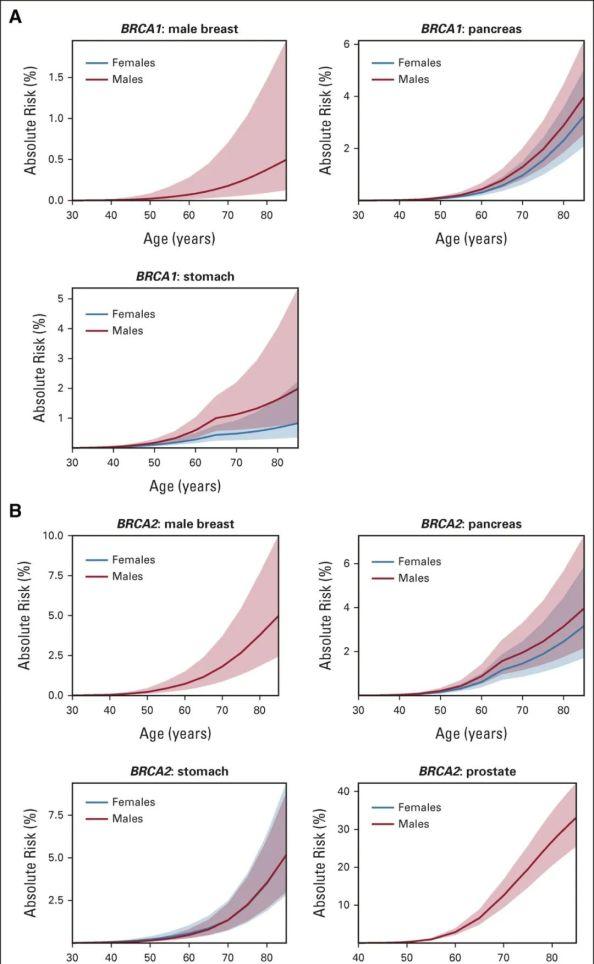Breast cancer susceptibility genes BRCA1 and BRCA2 are important tumor suppressor genes, once the pathogenic mutation occurs, it is easy to occur female breast cancer and ovarian cancer and other cancers. In addition to breast and ovarian cancers in women, accurate age-age estimation of other cancers associated with BRCA1 and BRCA2 pathogenic variants can help with effective cancer risk management. However, due to the small sample size and different results of previous studies, the effect of pathogenic variants of BRCA1 and BRCA2 on the risk of other cancers is unclear.
On January 25, 2022, the American Society of Clinical Oncology Journal of Clinical Oncology published online research reports from Australia, the United Kingdom, Italy, the United States, Denmark, Canada, Germany, France, Sweden, Spain, Greece, Cyprus, Malaysia, Lithuania, South Korea, Hong Kong, Singapore, Pakistan, Austria, and Colombia, based on data on BRCA1 or BRCA2 pathogenic variants from 5341 families in 26 research collaboration groups. The association of 22 cancer risks with BRCA1 or BRCA2 pathogenic variants was investigated.
Using BRCA1 data from 3184 families and BRCA2 data from 2157 families, including 14979 carriers of pathogenic variants, 9296 non-carriers, and 153323 untested, the study analyzed the age relative and absolute risk of 22 first primary cancer types and corrected them based on family lineage.
The results showed that the disease-causing variant of BRCA1 was compared with the non-variant:
Male breast cancer: 4.30 times higher risk (95% confidence interval: 1.09 to 16.96)
Pancreatic cancer: 2.36 times higher risk (95% confidence interval: 1.51 to 3.68)
Gastric cancer: 2.17 times higher risk (95% confidence interval: 1.25 to 3.77)
Colorectal cancer: 1.48 times higher risk (95% confidence interval: 1.01 to 2.16)
Gallbladder cancer: 3.34 times higher risk (95% confidence interval: 1.34 to 8.28)
BRCA2 pathogenic variants compared to unmutated:
Male breast cancer: 44.0 times higher risk (95% confidence interval: 21.3 to 90.9)
Stomach cancer: 3.69 times higher risk (95% confidence interval: 2.40 to 5.67)
Pancreatic cancer: 3.34 times higher risk (95% confidence interval: 2.21 to 5.06)
Prostate cancer: 2.22 times higher risk (95% confidence interval: 1.63 to 3.03)
Gastric cancer in women: 6.89 times higher risk (95% confidence interval: 3.71 to 12.78)
Gastric cancer in men: 2.76 times higher risk (95% confidence interval: 1.59 to 4.80)

Based on the UK cancer incidence rates 2008-2012, there is an age-specific absolute risk (%) and 95% CI of primary cancers in BRCA1 carriers (A) and BRCA2 carriers (B). (Image source: References[1])
By age 80:
BRCA carriers: the absolute risk of breast cancer in men was 0.4% and 3.8% respectively (95% confidence interval: 0.1 to 1.5, 1.9 to 7.7);
BRCA carriers: the absolute risk of pancreatic cancer is 2.3% to 3.0%;
Male and female BRCA1 carriers: the absolute risk of gastric cancer is 1.6% and 0.7%, respectively (95% confidence interval: 0.7 to 4.0, 0.3 to 1.7);
Male and female BRCA2 carriers: The absolute risk of stomach cancer is about 3.5%.
Absolute risk of prostate cancer associated with BRCA2 pathogenic variants:
By age 80: 26.9% (95% confidence interval: 20.5 to 34.7);
By age 85: 33.1% (95% CONFIDENCE interval: 25.5 to 42.2).
Therefore, the results of the very large sample study show that in addition to breast cancer and ovarian cancer in women, BRCA pathogenic variants are significantly associated with increased risk of male breast, pancreatic cancer, stomach cancer, etc., and BRCA2 pathogenic variants are associated with an increased risk of prostate cancer and are also closely related to age, but are not related to other cancer risks proposed in previous studies. The absolute risk at different ages will improve cancer risk management in both male and female carriers of BRCA pathogenic variants.